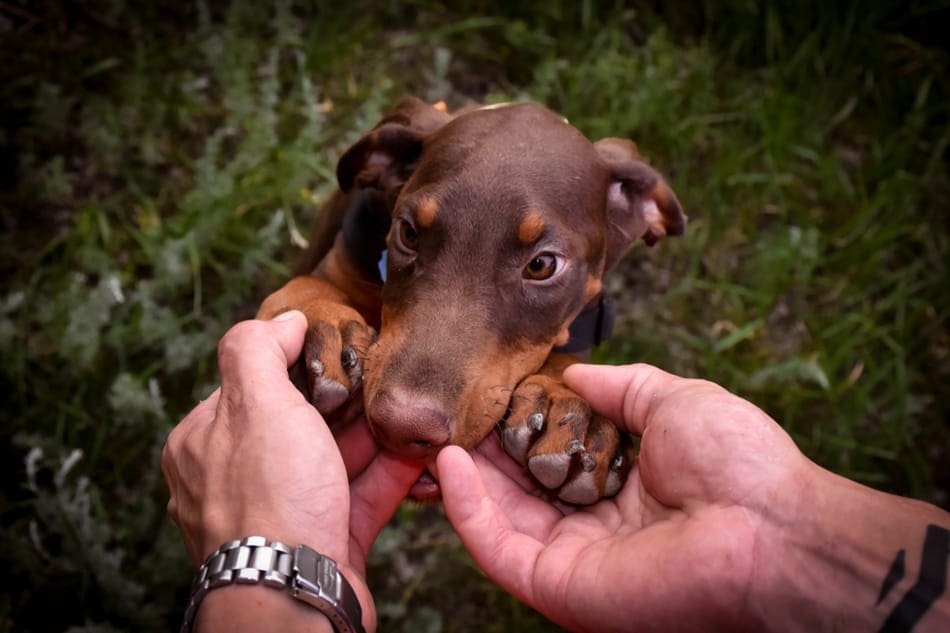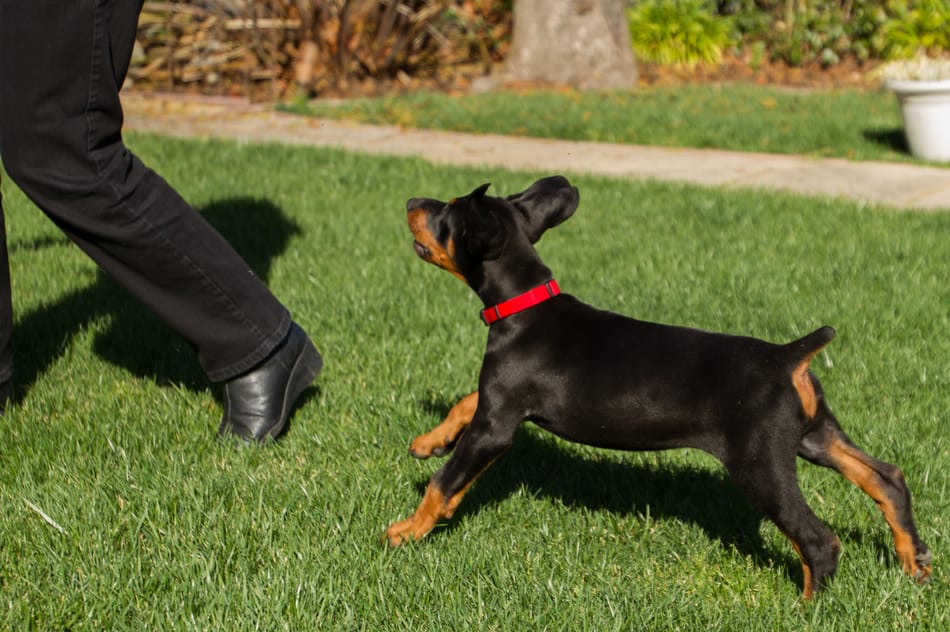When do Doberman puppies stop biting? This is a question that many new Doberman owners ask, as these puppies are known for their strong jaws and tendency to nip and chew on everything in sight. But here’s an interesting fact: Doberman puppies actually start losing their baby teeth at around four months of age, which can help reduce the amount of biting they engage in. However, it’s important to note that biting is a natural behavior for puppies, and it typically takes time and consistent training to teach them proper bite inhibition.
The process of teaching a Doberman puppy to stop biting involves a combination of socialization, positive reinforcement, and providing appropriate outlets for chewing and bite play. It’s also important to establish clear boundaries and let the puppy know what is acceptable and what is not. According to statistics, most Doberman puppies start to significantly reduce their biting behavior between six to nine months of age, although individual dogs may vary. By providing consistent training and guidance, Doberman owners can help their puppies learn bite inhibition and develop into well-behaved adult dogs.
When do Doberman puppies stop biting? Dobermans typically start biting and nipping as part of their teething process. The biting behavior tends to decrease as they reach around 4-6 months old. However, it’s important to note that every puppy is different, and consistent training is key in curbing this behavior. Provide appropriate chew toys, discourage biting, and reward good behavior to help teach your Doberman puppy to stop biting.

When Do Doberman Puppies Stop Biting?
Doberman puppies are known for their energy and playful nature. While biting is a normal behavior for puppies, it’s important to teach them when and how to stop. If you’ve recently welcomed a Doberman puppy into your home, you might be wondering when they will outgrow their biting phase. In this article, we will explore when Doberman puppies typically stop biting and provide you with some tips to help manage this behavior.
Developmental Stages of Doberman Puppies
Understanding the developmental stages that Doberman puppies go through can give us insights into when they may stop biting. Like all puppies, Dobermans go through various stages of growth and development. Here are the main stages:
- Newborn Stage (0-2 weeks): Puppies are completely dependent on their mother for nourishment and care.
- Transitional Stage (2-4 weeks): Puppies start to become aware of their surroundings and begin interacting with their littermates.
- Socialization Stage (3-12 weeks): Puppies learn crucial social skills, bite inhibition, and explore their environment.
- Rapid Growth Stage (3-6 months): Puppies experience significant physical growth and teething.
- Adolescence Stage (6-18 months): Puppies start maturing sexually and continue to refine their behavior.
- Adulthood (18+ months): Puppies reach full physical and mental maturity.
Biting Behavior in Doberman Puppies
Biting is a natural behavior for puppies, including Dobermans. It’s a way for them to explore their world and engage in play. During the socialization stage, which typically occurs between 3 and 12 weeks of age, puppies start learning bite inhibition. Bite inhibition is the ability to control the force of their bites, so they don’t cause harm during play or interaction with humans and other animals.
Doberman puppies may continue to bite during their rapid growth stage, which usually occurs between 3 and 6 months of age. This is because they are teething, and chewing helps relieve the discomfort caused by their emerging adult teeth. It’s important to provide appropriate chew toys and discourage them from biting on furniture or other undesirable objects.
As Doberman puppies mature into adolescence and adulthood, their biting behavior should gradually decrease. With consistent training and positive reinforcement, they can learn to control their impulses and redirect their energy towards appropriate play and interaction.
Tips to Manage Biting Behavior
While it’s normal for Doberman puppies to bite during certain stages of their development, it’s essential to teach them proper bite inhibition and redirect their biting behavior. Here are some tips to help manage biting behavior in Doberman puppies:
- Provide appropriate chew toys: Make sure your puppy has access to a variety of safe and durable chew toys to satisfy their teething needs.
- Use positive reinforcement: Reward your puppy with treats and praise when they exhibit appropriate behavior and avoid biting.
- Redirect their biting: When your puppy starts biting, redirect their attention to a chew toy or engage them in interactive play.
- Teach bite inhibition: During playtime, if your puppy bites too hard, let out a yelp or say “ouch” in a high-pitched tone to mimic how their littermates would react. This helps them understand the consequences of biting too hard.
- Provide socialization opportunities: Expose your puppy to different people, animals, and environments during the critical socialization period to help them learn proper behavior and reduce fear-based aggression.
- Enroll in obedience training: Consider enrolling your Doberman puppy in a puppy obedience class to learn basic commands and proper behavior.
When Do Doberman Puppies Stop Biting?
Doberman puppies usually stop biting as they go through their stages of development and mature into adulthood. While the biting behavior may be more intense during the teething phase between 3 and 6 months, it should gradually decrease as they learn proper bite inhibition and impulse control. Consistent training, socialization, and providing appropriate chew toys are key to managing and redirecting their biting behavior.
Key Takeaways: When Do Doberman Puppies Stop Biting?
- Doberman puppies typically stop biting around the age of 6-8 months.
- Their biting behavior is usually at its peak between 3-6 months of age.
- Consistent training and socialization can help reduce biting tendencies.
- Providing appropriate chew toys and redirecting their biting behavior can also be effective.
- Seeking guidance from a professional trainer or behaviorist is recommended for persistent biting issues.
Frequently Asked Questions
Here are some common questions about when do Doberman puppies stop biting:
1. At what age do Doberman puppies usually stop biting?
Doberman puppies usually stop biting around the age of 4 to 6 months. This is when they start losing their baby teeth and their adult teeth begin to come in. During this stage, their biting behaviors might decrease as they go through teething. However, it’s important to note that individual puppies may vary in their biting habits, and some may take longer to completely stop biting.
It’s crucial to provide appropriate outlets for your Doberman puppy’s biting tendencies during this time. Offer them plenty of chew toys and encourage appropriate chewing behavior. Additionally, consistent training and socialization can help discourage biting and promote positive interactions with other dogs and humans.
2. How can I discourage biting behavior in my Doberman puppy?
To discourage biting behavior in your Doberman puppy, it’s important to provide consistent and positive training. Here are some tips:
Redirect their biting: Whenever your puppy starts biting, redirect their attention to an appropriate chew toy or bone. This helps them understand what they should be chewing on.
Use positive reinforcement: Reward your puppy with treats, praise, and attention when they exhibit good behavior, such as not biting. This reinforces positive actions and encourages them to continue behaving appropriately.
Be consistent: Set clear boundaries and consistently enforce them. If you allow biting sometimes and discourage it other times, your puppy may become confused. Consistency in your training approach is key.
Provide mental and physical stimulation: Biting can sometimes be a result of boredom or excess energy. Make sure your Doberman puppy gets enough exercise and mental stimulation through activities like walks, puzzle toys, and interactive play.
3. Is biting common during the teething phase?
Yes, biting is common during the teething phase in Doberman puppies. This is because the discomfort and itchiness of teething can drive them to bite and chew on objects to relieve the sensation. Providing appropriate chew toys and bones can help satisfy their chewing needs and alleviate teething discomfort. It’s important to be patient during this phase and continue reinforcing positive chewing habits.
However, if you notice excessive bleeding, swelling, or persistent pain during your puppy’s teething phase, it’s best to consult with a veterinarian to ensure there are no underlying issues with their teeth or gums.
4. Can biting be a sign of aggression in Doberman puppies?
Biting in Doberman puppies is not necessarily a sign of aggression. Puppies explore the world with their mouths, and biting is a natural behavior in their development. However, it’s important to differentiate between play biting and aggressive biting.
Play biting is usually light, accompanied by wagging tails, and is meant for exploration or interaction. Aggressive biting, on the other hand, may involve forward body postures, defensive behavior, growling, and biting with more force. If you observe signs of aggression in your Doberman puppy’s biting, it’s important to seek professional help from a qualified dog trainer or behaviorist.
5. Should I seek professional help if my Doberman puppy’s biting becomes uncontrollable?
If your Doberman puppy’s biting becomes uncontrollable or persists despite consistent training efforts, it’s advisable to seek professional help from a qualified dog trainer or behaviorist. They can assess the situation, provide personalized guidance, and help address any underlying behavioral issues that may be contributing to the biting behavior.
A professional can also help determine if there are any medical factors, such as pain or discomfort, that may be causing or exacerbating the biting behavior. Remember, it’s important to address biting behavior early on to prevent it from becoming a long-term issue and to ensure a harmonious relationship with your Doberman puppy.

Doberman puppies typically stop biting between the ages of 4 to 6 months.
During this time, it’s important to provide consistent training and redirection to discourage biting behavior.
